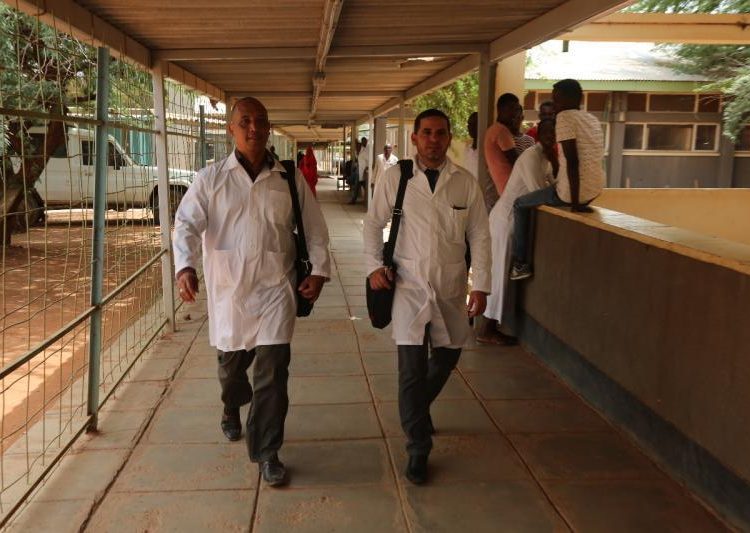On Friday, three months after the kidnapping of two Cuban doctors in northern Kenya by alleged members of the Somali Al-Shabaab jihadist group without any news about the captives, the operation to rescue them continues.
The track of surgeon Landy Rodríguez and general medicine specialist Assel Herrera Correa was lost on April 12, when they were traveling in an official vehicle to work at the Mandera Hospital, near the border with Somalia.
That day, Rodríguez and Herrera were escorted “as usual,” Kenyan Police spokesman Charles Owino confirmed at the time to EFE new agency.
However, the convoy was intercepted by armed men who, after a shootout in which one of the policemen who watched over their safety died, kidnapped the doctors and took them to Somali territory.
The governor of Mandera County, Ali Roba, at the time noted that “alleged members of Al-Shabaab” had kidnapped the doctors.
To date, the kidnappers have not provided any evidence about the fate of Rodríguez and Herrera, although the Kenyan and Cuban authorities reiterate they are still alive.
“The efforts continue to rescue the doctors, but I don’t know when they will be released. What I do know is that they are alive wherever they are,” said the police commander of Mandera, Jeremiah ole Kosiom, in statements quoted by the local daily Daily Nation, without giving further details about the search plan.
In a similar tone last week, Cuban Health Minister José Ángel Portal said to the Cuban media that the doctors are still alive and “all possible actions are being taken for their return.”
Portal did not specify on the efforts being made by the Cuban government and limited himself to indicating that the high-level dialogue between Cuba and Kenya to free the doctors continues.
In this regard, the Cuban Ambassador in Nairobi, Ernesto Gómez Díaz, explained to EFE this Friday that “many steps are being taken through different means, but this is still a process that can be long and complex.”
“Efforts are still being made and we are confident that we can recover them. We unfortunately have no news to give,” insisted the ambassador.
The Cuban minister also stressed that, “so far, no one has requested any kind of condition in exchange for the doctors’ release, despite some information that appeared in the press and later was denied.”
That comment contradicts the testimony offered last May by a group of elders from Kenya and Somalia who traveled to the Somali region of Jubaland, controlled by Al-Shabaab, to negotiate on behalf of the Cubans.
Those leaders claimed to have seen the doctors alive and providing medical assistance to the local community between the Somali towns of Buale and El-Ade, and specified that the kidnappers had even demanded a ransom of about 1.5 million dollars in exchange for their release, the local press reported.
“The amount was higher than that published in the media,” one of the Kenyan elders who interceded for the release of the doctors said under anonymity, quoted by the Daily Nation.
That mediator said that the payment of a ransom was negotiated, but the parties did not reach an agreement.
The Kenyan government―a country hit hard by terrorism on its north-eastern border since its army invaded Somalia in 2011 to pursue Al-Shabaab―has so far been against any payment that could encourage further kidnappings.
“They (the Somali elders) warned against sustained military attacks on their camps in the search for the Cubans, and we agreed with the condition that the doctors should not be harmed,” the aforementioned Kenyan traditional leader added.
Landy Rodríguez and Assel Herrera Correa are part of a contingent of 100 Cuban doctors who arrived in Kenya in 2018, under a bilateral agreement to improve access to specialized medical services in the African country.
Once in Kenya, the two doctors who were kidnapped expressed their concerns about security in their new destination, according to the Kenyan television network Citizen TV.
“My reaction was bad because when I searched this site on the internet, it said that it was a very dangerous place due to the Al-Shabaab attacks,” said Rodríguez; while Herrera assured that his experience in countries like Venezuela and Brazil, which also generate “very complicated situations,” could help him in this professional stage.
After the kidnapping, the Kenyan authorities relocated to safer areas the Cuban doctors deployed in Kenyan counties bordering Somalia, where Al-Shabaab, which joined Al Qaeda in 2012, is fighting to establish a Wahhabi style Islamic State.
Since the overthrow in 1991 of dictator Mohamed Siad Barré, Somalia is a country shaken by conflict and chaos, without an effective government and in the hands of radical Islamic militias, warlords and gangs of armed criminals.










